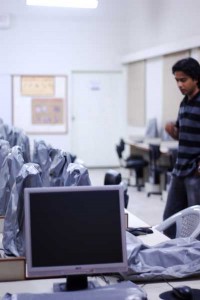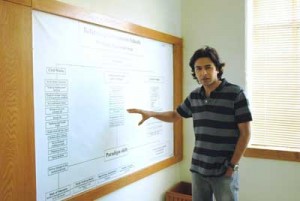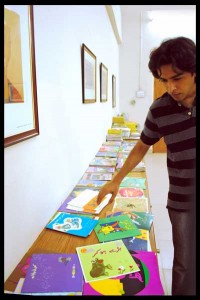Life Beyond the Concerts
By Nadir Siddiqui | News & Politics | People | Profile | Published 16 years ago
When I first went to meet Shehzad Roy, I thought we would be talking primarily about his music. It was natural to assume that having produced his most popular single and a very thought-provoking album, he would be dwelling on his own work. So as I waited for him to arrive at our meeting, I imagined him launching into an enthusiastic discourse about his first foray into independent writing and composing; he was after all, a musician first.
I was wrong.
It’s odd that a musicians’s most substantial work is produced when he has relegated his art to a secondary position in his life, but it seems that Shehzad Roy has done just that, and this has actually resulted in him making better music. What, then, is his first passion? The answer is: education. When we met for the first time, our conversation only lasted 15 minutes. He asked me what the purpose of my interview was and I told him I wanted to talk about his album. He politely answered some of the questions, but quickly switched gears and asked me to reschedule the interview for the next day: “Is it possible to do this interview at the school? I want to show you the school we [Zindagi Trust] have changed.”
Roy was recently awarded the prestigious Patricia Blunt Koldyke Fellowship on social entrepreneurship by the Chicago Council on Global Affairs. He will be travelling to Chicago in late October, where he will attend seminars, workshops and meetings to discuss the system and quality of education in government schools in Pakistan.

“These kids deserve the same things you and I use in our schools,” says Roy. Photo: Nadir Siddiqui
The next day, I found myself struggling with frenzied Saddar traffic near Gandhi Garden. Fighting chaos and a poor sense of direction, I finally reached the SMB Fatima Jinnah School and entered its gates. The change was remarkable — the school was like a peaceful haven inside the throbbing heart of the city. Polite guards greeted me at the gate and pointed me in the direction of the entrance, and as I started walking across the grounds I found it hard to believe that I wasn’t in one of Karachi’s more prestigious, private schools. I was led into a large, inviting room, where Roy was waiting for me. As I sat down at one end of a huge conference table, I took in the sights: bright lights and sparse modern furnishing adorned the spacious meeting-room, while a large wall-length board covered the facing wall.
“This is where we bring our students to have open discussions and debates,” he said, “They start out as simple-minded girls who don’t really know what to say, because they’ve never had such an open-thinking environment before, but it’s so wonderful to see the change that comes in them from just being in this room and in this environment. Within a few days you can see the change in their thought processes, the spark of inquisition, debate and opinion that arises in them.”
We spent the next hour looking around the premises of the school, talking about the goals, problems and challenges of revolutionising Pakistan’s education system. The school now has a finely maintained chemistry lab, computer lab, a massive art room, library, staff rooms, playground, cheery halls and a very clean environment. Teaching has changed too, with new and appealing techniques being applied, and even exposure to activities like violin classes and photography. On all accounts, the school looks and feels like (sometimes even better than) any of the best private schools in Karachi or even Pakistan.
We stopped at the rows of flat-screen computers in the lab and started talking about the concept of charity among our more privileged classes. He explained how many people have asked him why the lab needs to have fancy flat-screens and not just basic computers. “These kids deserve the same things you and I use in our schools. Why should they settle for anything but the best?” Roy said. “We want to help the impoverished, but we don’t want to actually lift them out of poverty. This is why we give them sub-standard items. I hate this mentality. We should work to give them what they truly deserve, and not this compromised stuff which says ‘something is better than nothing.’ Sometimes it is not. In healthcare or education, if you provide the wrong ‘something,’ you will destroy the person’s life.”

Back to school: Shehzad Roy. Photo: Nadir Siddiqui
Roy goes on to describe the sorry state of government schools in Karachi. He relates the first obstacle the Zindagi Trust faced when they came to the school. “When we first visited the school, the teachers and administration said: ‘Please rid us of these dogs.’ We didn’t understand what they were saying. We assumed it was some figurative term for the public abuse of these schools as well as the encroachment and crime that takes place here. But to our amazement, the school was actually full of stray dogs, roaming inside the classrooms and the school premises.”
At night, the situation was different. In addition to stray dogs, the school was occupied by drug addicts and sometimes also by influential people, who used the grounds for whatever purpose they wished. Littering, on and around the premises, was another problem. “In the back alley, trash was piled up higher than your height, and packed against the windows so that you couldn’t even look outside. There was barely any electricity. We’ve had to install generators, redo the wiring, clear the grounds to make room for courts and a track.”
He stops by a bright calligraphic painting by Gulgee in the main lobby and remarks that before, in its place hung a drab- looking Quranic scripture frame. “When I took this down, they said that you are anti-Pakistan and anti-Muslim. It’s ridiculous that we expect little children to be interested in dull and sombre images — this stuff just stifles a child’s imagination and makes him/her totally uninterested in the subject.” Islamiyat is also taught differently at the SMB Fatima Jinnah School. The books used are those published by The Book Group, and are used by almost all private schools across the city. Filled with colourful illustrations and tiny doses of writing, they encourage reading and learning, says Roy. “The book leads the child through a sense of scale; ‘Look at this elephant, it is so huge, but look how small it seems in front of this blue whale, the largest creature on the earth.’ It goes on with further comparisons till it reaches the scale of the whole universe. On the last page it says, ‘Now imagine that Allah made all these things, how great must He be.’”
The library was also a subject of much enthusiasm for Roy, “I contacted my friend Ali Alam and told him I want a library that will rival the library at Karachi Grammar School. I want these kids to have books that are read in the best schools. None of these books are hand-me-down copies that speak of charity and compromise.” Shahzad Roy recalls how different the earlier library used to be — a small shed where children sat in rows, swaying back and forth as they read. Now, the library actually looks like one, where children come to read and enthusiastically learn about their surroundings.
Throughout the meeting one question kept bothering me and I finally asked him: “You’ve done a great job setting up this school and revolutionising the system here, but you can’t expect to run it forever. Moreover, the real solution is for all the schools to become like this one, and for the government to run them with the same philosophy as you are. But our government seems least concerned and, in fact, is fiercely resistant to change. What are you doing about that?”
Roy agreed that this posed a big challenge, but that they were handling it in a step-by-step manner. Using this school as a model, Zindagi Trust will first prepare the administration/government to take over the school and keep running it the way it is being run now. On a country-wide level, Zindagi Trust is fighting, first and foremost, for changing the schoolbooks. He and Sami Mustafa (his partner in Zindagi Trust) are pushing the government (with help from people like Imran Khan) to permanently employ Book Group textbooks in all the government schools, so that the syllabus and teaching style finally changes after decades of keeping the same stifling literature and teaching material. “Stupid school systems kill your thinking and put you in a state of denial, so you don’t ask questions,” argues Roy. “Even vocational training is better than exposing a child to such a system. So if we change the books, even bad teachers cannot stop the blossoming of thought which these specially-designed books inspire. The books currently in use are designed for the pathetic concept of rote learning. For instance, one book says, ‘Javed has three rooms in his house, how many do you have?’ Now, the answer the students must give to that question is, ‘three’, regardless of whether they actually have two or four rooms in their house. The only answer is ‘three’ and if they give any other answer, they will fail their exam.”
Each government campus is actually divided into eight schools. Zindagi Trust is working to change this so that each campus is just one school with everything, including extra-curricular activities and basic healthcare, under one roof and administration. They are also pushing for not having exams till the seventh grade, and a freer, more modern style of education, which gives the kids the message that imagination and independent thinking is good, and no matter how different the students are or how unfortunate their circumstances, it’s okay — “Koi Baat Nai” is the title of one of the books being taught at the school today.
“Goodness is contagious,” repeated Shehzad Roy throughout our meeting, and I truly understand what he meant. Before I visited SMB Fatima Jinnah School, I was skeptical about the possibility of change in the regressive administrative environment of Pakistan, but after seeing the wonderful energy pulsating through this school for myself, I can’t imagine how even the most stubborn among us can resist such a change, that has brought a dog-and-drug-infested school to life.



